- Home
- J. Edward Neill
Machina Obscurum Page 17
Machina Obscurum Read online
Page 17
The inside of Kilo Theras’s left arm was cut and bleeding from wrist to elbow. A lateral gash across his bare abdomen had let loose a sheet of red that covered his stomach and stained his breeches. Blood streamed down to the marble. He held in his one working hand his knife, coated in blood. Behind him, on a large half-completed mural depicting men and women in the throes passion, complete with dozens of teats and a few well-formed cocks, he had written, in his own blood and viscera, in script as large as he could muster, bathed in the flickering lamp light, one word.
One word.
Three letters.
“It’s over, Kilo,” Drav, sabre at the ready, called up at the man. His voice echoed throughout the empty chamber, bouncing off walls and high, arched ceiling. The Herald did not seem surprised to have company. His skin was white as an Eastmont snowcap; his eyes were fluttering, straining to stay open. He was dying, by his own hand.
The killer looked at Astia and tried to focus. “Yes. I know,” he said quietly.
Drav looked up to three letters writ large above them.
“What does that mean? What are you trying to tell us?”
A grim smile graced the painter’s lips. “We have told you everything,” he said. “Heed it. I beg you. Heed it.”
“Talk to me, Kilo. Tell me what— “
“I am The Herald!” the murderer spat with what was likely his last ounce of rage. “Kilo was weak. Kilo was insignificant. Kilo was… was…” He dropped the knife and it clattered to the marble floor. His hand drifted down to his stomach. He brought it back up, coated in blood. Felt its slickness with his fingers. “I needed paint.” His eyes rolled back into his head and he pitched forward, off the scaffold, and hit the floor with a crunch.
Astia approached the body. As if his self-inflicted wounds weren’t already fatal, he had cracked his head open on the marble. Kilo Theras had managed to kill himself twice.
Drav sighed. The hunt was over.
The battle won.
The Herald was dead.
The relief and pride that Drav usually felt in such moments did not come. Instead, his stomach tightened, his hands shook, and dread arose.
He picked up the killer’s bloodied knife. It was wide and flat. Sharp, but not the proper tool for cutting into a man’s chest. No wonder each scene had been so grisly. He had used its flat side to scrawl his message on the wall.
It had been his brush.
The Gloomwalker was unsure if Kilo Theras had been a madman or a Seer. A criminal or a prophet. He might never know, but prayed to Lo and Healda and Beadu for the former.
He looked up again, although he already knew what it said. He would never forget it.
One word, written in blood over a profane mural.
Three letters, a murderer’s final act.
A warning, The Herald’s last:
WAR
Crispin
An excerpt from the novel A Spark of Magic
J.L. Clayton
C rispin shuddered with pleasure.
He’d killed the Cherokee men; however, he decided out of malice, of course, to spare the leader’s life.
He left the proud man broken, knowing that he had failed his people. Even as he warned the man with a message of death, Crispin was still unsatisfied. Yes, the battle between his followers and the Indians left much to desire. He clenched his teeth looking down on the now crippled, broken and defeated leader. Crispin smiled thinking that this was far too easy—the battle, if that was what it should be called: no it was more like a slaughter. Crispin shook his head mockingly; he hadn’t suffered a single scratch, while his servants had all perished. Not even that wretched wolf could break his skin. Although, the way in which the beast eradicated his strongest Mages was very impressive.
The fact was that he needed a toy like that, something that he could bend to his own will. And yet the thought saddened him. Nothing seemed to satisfy the gaping hole that permeated his soul. Staring out at the rolling green hills which were such a contrast to the destruction with which he had surrounded himself: it was once so beautiful. Crispin sighed and with a single thought, he manifested himself back to his Kingdom, and very far from those pathetic humans and their disgusting stench. Exhaling warily, Crispin sagged onto his throne and gazed about. His Kingdom was dark and tedious, with brick and mortar covering the inner chamber, a huge dais right in the middle of his palace. Upon the dais sat Crispin’s throne: a perfect place to see all his loyal subjects. Crispin observed his wary servants out of the corners of his eyes and smirked. They were afraid, and with good cause. He had the power to disembowel them with a thought.
Crispin scratched his chin, considering.
No, he would not destroy them today, seeing that he was satisfied.
For now he would let them live—his followers, his sheep, his cannon fodder—they were after all besotted with his power and his beauty, and who could blame them. He was, as usual, amused at the fact that they were willing to do anything for him. Crispin was the most powerful being to ever exist. Crispin was a Traveller—always in search of power—always in search of that one thing he never had.
“One day!” Crispin shouted, hitting his palm on the armrest of his throne.
All of his loyal followers gasped, frozen in panic: watching, listening and waiting with a frightful anticipation of what he would do and say next, of what horror he would bring to them this time.
“One day I will have everything!” He roared. “One day, I will have . . . her!”
Crispin looked around with a menacing scowl, knowing that everyone was all too well aware of what that meant. Scattering like mice from a cat, they fearfully fled to their rooms, knowing that bad things would follow if they stayed. As for the stragglers, he just snapped his fingers, and turned their bodies inside out. Ten or so beings fell to the floor writhing in agony. Crispin knew this was a painful way to die, so he rarely punished his followers with this kind of torture. But today he felt ‘generous.’ When their screaming became exasperating, Crispin snapped his fingers again, and all at once bliss fell upon the chamber.
But the silence did not make him happy.
“If only I knew who she was,” he whispered.
The only thing he had to go on was what the Three Hags of Fate had foretold when they foresaw a chosen one, a girl with the power to destroy him. However, Crispin welcomed the challenger—because his experience was greater than her youth.
“No. She will fall for me and then I will have her. Every last drop of her, body, mind and soul. Then I will take her life and her power!” He howled. “Yes!”
Crispin laughed. It was a dark sensual sound that vibrated through the halls, wrapping itself around the bodies of his people in a tight embrace, stroking and caressing their insides and sending shudders of pleasure through them. He heard gasps and moans of delight, and some cries of loathing. Some welcomed his touch, while others did not want it at all. Yet Crispin didn’t care, the only thought he had was of her.
“My unknown, faceless, powerful being!”
Crispin liked the sound of that.
Murgul
An excerpt from the novel Hollow Empire – Night of Knives
J Edward Neill and John R McGuire
“T ell us another one! Tell us another one!” the children chanted. “Please, Murgul! Just one more story!”
How can I resist? He looked at their smiling faces, so pink and flush with life. A few weeks ago, most of them had been dying. They had come to Tolem’s hospice to finish their suffering in peace, yet all of them had recovered. Luka’s potions had worked unforeseen miracles, curing little Kasia’s rotlung, melting sweet Lys’s tumors away, sparing Jacek from an infected sword wound, and saving eleven others from various horrific maladies. Even Luka had been surprised. Murgul swiped away a tear of joy and tried to remember another story. And nothing surprises Luka.
“Ahem…” He arched his aching back, the bones in his spine popping. “One more story then. Let me think. I suppose you’d all
like something grim. You always do, don’t you?”
“Yesssssssssss!” the children shouted all at once.
“I thought so.” He settled onto the curved-back bench. “So where do we begin? Ah yes, the Dead Days. If you had mothers and fathers, they would be angry with me for telling you this, but here we are, just you and me. I’ve told you all how it all ended, so to finish it we’d best go back to the beginning…”
As the sun set and shadows invaded the rot-roofed enclosure behind the old hospice, he told the children how the Dead Days had begun. The spread of the Lichy had been a dread thing, with whole cities devoured and entire populations destroyed. He meant to spare the children no details, no matter how gruesome, for though they were young, not one among them was soft-stomached. All of them had survived their own personal plagues, and for that he owed them the truth.
“…it was only a year after the Lichy started that I caught it,” he told them a short while into the tale. “I was fifteen, sturdy as an ox, or so said my pa. We were on our farm an hour’s walk west of Vernam. I’d already seen it turn my sisters inside out. Karenna, Murtha, and Irina, oh how I adored my sisters. They were the stars in my sky, my three pretty moons. But the Lichy didn’t care. It bloated their eyes, turned their bones into porridge, made their fingers fall off, and stole their minds. Father had to burn them in the end, so as not to let the Lichy escape. The fires broke my heart, they did, but pa made me swear I wouldn’t cry. ‘Crying lets the Lichy in,” he’d say, and I believed him. I just wished he’d let me hug them before they died. It’s all I wanted.
“When the sickness came for me a week later, I tried to hide it. I wanted to believe it couldn’t catch me. I was wrong. I lay in bed one night, and when I got up to make water, I felt my toenails slide right off. I wore three pairs of socks the next day, and pa didn’t see. But the next night, my elbow joints burst and the pox marks striped my face. I hid in the barn and cried my wee heart out, hardly brave for a boy of fifteen. The next morning I went to tell pa. But he was already dead, you see. He’d tried to hide it, same as I. I found him lying in his bed at dawn, pox-riddled from neck to shin, his teeth all fallen out. I was all out of tears by then. He hadn’t let me hug him either. It was too late for goodbyes. The sun shined on his face, and I knew by the next morning it would shine on mine.”
“But you lived, Murgie,” blurted Lys, youngest of the lot.
“I did, didn’t I?” he said it as if it still amazed him. “But no one else in Vernam did. After a week, I was a monster. My legs barely worked, same as today, but somehow I crawled to the city. I saw what the Lichy did, and I knew it’d be the same for all the other cities in Vhur. There were fire pits from where they’d burned the bodies. There were some huddled in their houses, whole families who’d died together. Still others had been murdered before they’d even caught it. I saw the remains in gutters, in bathhouses, and even in the street, all cut up by the axes and swords. Worse were the animals and the children. There were puppies, foals, kittens, ravens, lambs, and babies. All of them looked different, but all of them looked the same.”
The children sat in silence, waiting for more. If they were horrified, they hid it well. See, the truth is best, he reassured himself. Lying to children teaches them nothing, and it’s a sin besides. Best they know what’s real and what’s not.
“Vernam took the worst of it, or so they say,” he continued. “It was…oh, maybe nineteen years ago, maybe twenty. Best count your blessings none of you were even born yet. By the time the Lichy was done, all the cities except Othis and Eos were hollowed out. I met a few survivors here and there as I wandered, and as far as I know they’re still alive, but everyone else is gone. The Lichy had no mercy. It ate and ate until it ran out of food.”
“But Murgie,” Lys looked sad, her moonlike eyes watering in the corners, “what if we got the Lichy? Would it eat all of us?”
A smile broke on his mouth, twisted and deformed, but a smile nonetheless. “Here’s the thing, my little friends; the Lichy is done and gone. I promise you that. It may be there’s a case or ten out on the frontier, but good King Dmitri and his godly friends have shut the plague out of the heartland. Now that you’re all well again, you’ve got a chance to live good, healthy lives. Don’t fret about the Lichy. There’re worse things these days.”
“Where will we go?” asked Jacek, a lad of twelve nearly murdered by his brother over a half-loaf of bread. “When Luka boots us out, that is.”
He thought hard on that one. The truth felt fuzzier here. “Well…I…it’s true; Tolem is a ruin. And with everyone on the mend, Luka will want to bring more children in.”
“Which means we’ll have to leave,” Jacek interjected.
“Yes, I suppose that’s so. If it were up to me, I’d take you all to the capital. Othis is a grand place, they say. But they’d never let me in, not with the way I look. They’d assume I had the Lichy, and they’d burn me.”
“So we’re stuck here?” asked Kasia innocently.
“It may be so.” He slumped. “But Tolem might not be so bad. Not many people get sick here, especially those who come to see Luka. They’ve even started building a second church. Perhaps you could all be servants of God. The priests are always…”
“But I don’t want to be a Scarred Sister,” Kasia complained. “They scare me!”
“You can’t be one,” he explained. “You have no scars. And you’re too young and too sweet besides.”
Jacek made a sound like a whip snapping. “Or we could all be Bloody Monks. We’d chase everyone around with our scourges! Crack, crack, crack!”
“You don’t want to be one of those either,” he explained. “They beat only themselves, not other people. I once saw a Monk whose whole back was peeling off his bones. And still he flailed himself, screaming about being some vessel for God’s anger. It’s madness, if you ask me. But there’re other ways to serve God. You don’t have to dress in filthy rags or whip yourself raw. You can serve quiet-like. Tolem is on the mend. Join the church, and they’ll feed you and give you a roof, and…”
Somewhere in Tolem, a bell rang. It was dark now, and the city’s curfew was closing in. Murgul jumped at the noise. He dreaded curfew. I have to leave the children and crawl back to my cave.
With smiles and giggles, the children fled back inside Luka’s hospice. He watched them go, murmuring each of their names as they walked past. He loved them so, and it hurt to watch them leave. Little Lys went last. She touched his hand, her palm like sunshine on his skin, her eyes twinkling with curiosity. “Why can’t you stay for supper, Murgie?” she asked the same as she had the last three nights.
“Well…I…” The lump in his throat grew. “If I stayed for supper, my sweet, I couldn’t go home without breaking curfew. Luka doesn’t have room for me to sleep. He needs it for new patients and experiments.”
“But you could sleep in my room. The floor isn’t too hard. I could give you my pillow.”
“My sweet Lys.” Her innocence made him smile. “You know I’d love to stay with you children, but it’s not to be, not yet anyway. Luka lets me work and tell my stories, but he’s really afraid of me just like everyone else. He only keeps me around for good luck, so he says, and because I keep you lot busy.”
“Well I’m not afraid of you,” Lys declared.
“And for that, I’ll always love you,” he said. “Now run off. It’s suppertime, and Luka promised soup.”
Lys skipped away. He watched her vanish into the room past the enclosure, beyond which her friends were gathering for supper. Afterward he sat on his bench and beamed, but when the shadow emerged from the hospice, he stiffened. If anyone in Vhur was near as ugly as he, it had to be Luka, the old alchemist of Tolem. Luka was well past his prime, and the years have been almost as hard on him as on me. Wispy black hair grew in patches from the alchemist’s wrinkled scalp, and his nose looked like a beak, sharp and ready to peck. His mottled, skinny arms resembled a spider’s legs, while the backs of his
hands were scarred from experiments gone awry. Murgul cringed when Luka’s shadow fell across him. Let it be a good night, he hoped, not a bad one. Luka is nice sometimes, but terrible just as often. I never know which one to expect.
“There’s for you, Maggot.” Luka jabbed a loaf of bread into Murgul’s hands and glowered. Though he lorded over Murgul like a thundercloud, the alchemist’s mood seemed less foul than usual. “And tomorrow you’ll be gettin’ your silvers. Now then, see yourself off my porch. If you get another whipping for breaking curfew, I’ll bring someone else in to do your work. You’re pitifully slow as is.”
“Thu…thu…thank you, Luka,” Murgul stammered as he creaked to his feet. “Are the new children coming tomorrow?”
“In two nights. And you know what that means.”
“The cured ones have to leave.”
“That’s right.” Luka’s lips looked sharp and pitiless. “All of them. My potions are near perfection, you see. In a few months, I’ll have all of Tolem healthy, the villages too. Dmitri will hear of it and send for me. I’ll drown in his silvers, I will. I’ll build me a tower on the side of Black Mountain and forget all about this place, your ugly face especially.”
Luka’s abuse no longer wounded him. The alchemist’s japes were far less cruel than what the rest of Tolem heaped on him. “So you’ll just leave?” Murgul dared. “What if more children get sick?”
“They can buy my potions just like everyone else. Luka’s Red for the wounded, Luka’s Brown for the ill, and Luka’s white for…well…you know. In case the you-know-what comes back.”
“Do you think…?”
“No,” Luka snapped, “I don’t. Now get off my porch. I can’t have you sleeping out here. You’re a good worker and all, and the children don’t seem to hate you, but you’re harder to look at than a Scarred Sister’s poxy arse. It’s a wonder the guardsmen haven’t slaughtered you just for that.”

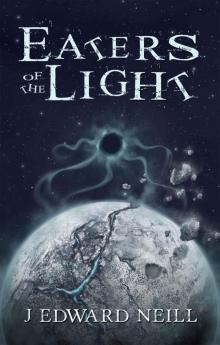 Eaters of the Light
Eaters of the Light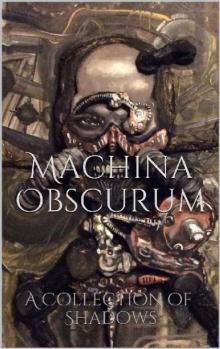 Machina Obscurum
Machina Obscurum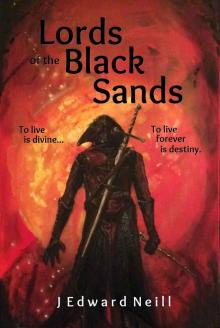 Lords of the Black Sands
Lords of the Black Sands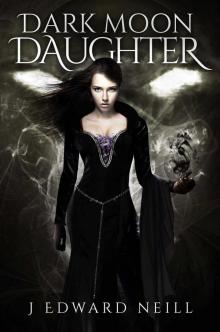 Dark Moon Daughter
Dark Moon Daughter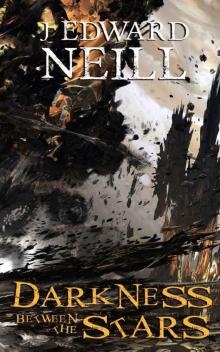 Darkness Between the Stars
Darkness Between the Stars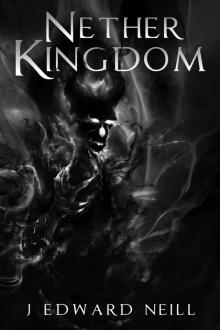 Nether Kingdom
Nether Kingdom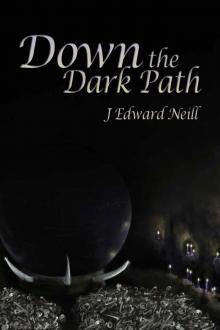 Down the Dark Path (Tyrants of the Dead Book 1)
Down the Dark Path (Tyrants of the Dead Book 1)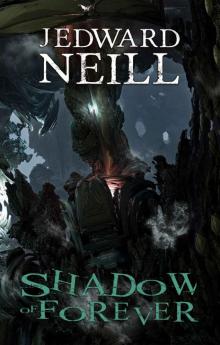 Shadow of Forever (Eaters of the Light Book 2)
Shadow of Forever (Eaters of the Light Book 2)